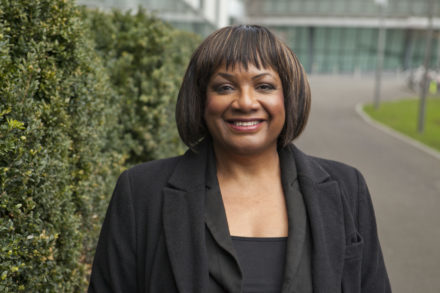
Our immigration rules are badly in need of urgent reform. Yesterday’s speech by shadow home secretary Diane Abbott addresses a key issue concerning the irrational and unreasonable way our immigration rules treat families. It’s time for this to change and Abbott’s comments are a big step in the right direction. Such leadership is a welcome sign of how serious – and ready – Labour is to form a government.
Abbott’s key message was that Labour supported a “fair and reasonable” immigration – and we would correct the unfairness and unreasonableness of nearly two decades of Tory incompetence and mishandling.
Specifically, she highlighted the need to end “family break-up through the immigration system” as a critical example of where the rules where neither fair nor reasonable. She said: “We will allow the carers or parents of admitted child refugees to come here. We will also end the practice of deporting the children, currently without entitlement to be here, once they turn 19, even when their parents are entitled to be here.”
These are welcome reforms. Under the current system, an adult refugee granted asylum can bring family to Britain to support them. But an unaccompanied child refugee – the most vulnerable of the vulnerable – cannot risking deportation on becoming an adult. This is an immoral, impractical anomaly that has continued for too long. It is neither fair nor reasonable to continue it – and an excellent example of how Labour’s approach would yield genuine progressive change for the better.
In researching my book Becoming British, I interviewed over 200 people from various walks of life across the UK. One of the most heartbreaking issues was how the rules did break British families up. I met one couple who received advice from the British High Commission plus reassurance from the Home Office in writing, on recommendation of a qualified immigration solicitor, about returning to the UK from abroad. He was British, his wife was North American and had a teenage child. They had been told in writing they could apply for a spousal visa on arrival into Heathrow. This used to be true, but the rules had changed and neither the solicitor nor immigration officials seemed to know they were wrong.
The spousal visa was denied at the border. In order to enter the country after their flight had landed, his wife and step-child received visitors’ visas and were advised to apply for a spousal visa after arriving in the UK. But again the rules had changed, disallowing such applications. Instead of getting confirmation his family could reside in Britain with him, they were served with deportation orders. The reason was that they had accepted temporary entry but must have deceived the border agent on entry because what they really wanted was permanent residency. None of this true, but the one picking up the pieces and paying heavy legal and visa application costs is a British citizen. This cannot be right. It’s certainly not fair or reasonable.
I spoke to other couples who had different stories of how the rules let them down. A common factor is the income threshold, which requires a British citizen to earn over £18,600 in Britain in order to sponsor a spouse or family member. Not everyone earns this amount and there’s no accounting for the income earned by non-UK citizens who can pay their way without placing any burden on taxpayers. The rule basically tells citizens who they can or cannot love if they want a life in Britain.
And why? All to help meet an arbitrary net migration target – that Abbott has also rightly come out to oppose. Make no mistake about it – 100,000 or less is a number conjured up from nowhere. It has led to a failure to recruit doctors and nurses to our NHS filling vacancies. How ironic – and tragic – that an arbitrary target meant to secure sustainable migration actually means longer A&E queues and a decline in public services. Fewer migrants doesn’t mean less impact, especially where migrants are more likely to be in A&E as doctors or nurses than patients.
It’s why Labour should take its fight for a fair and reasonable system to focusing on impact and effects over arbitrary targets. The issue is improving public services, delivering housing for first-time buyers, creating employment opportunities and the like. Stopping immigration doesn’t achieve these goals. But nor should we overlook the impact migration does have. One Labour policy in our 2017 manifesto was the Migration Impact Fund – which I hope becomes expanded as a Migration Impacts Reduction Fund – focusing on targeting specific needs where they occur.
We could go further and expand the Migration Advisory Committee – a small group of economists providing independent advice to government – to include law and social policy experts who can better advise on the socio-economic impacts of migration policy changes. They might produce migration impact assessments to replace arbitrary net migration targets and allow us to focus on impact.
Our immigration rules are too often cobbled together in a piecemeal, ad hoc fashion. A major review and overhaul is long overdue. The rules change so frequently, few on the frontline know for certain what they are and the people paying the price are often British citizens, leading to family break-ups, misery and a system that is unfit for purpose.
I’m thrilled by Diane Abbott’s speech and the welcome new path she is setting for Labour and our country. No doubt there is more to come and much to do. But now Labour is in a genuinely strong position to get this right – and we’ll all be better for it.
Thom Brooks is Dean of Durham Law School.




More from LabourList
‘I spent years telling workers the law couldn’t help them – that has changed’
Josh Simons resigns as Cabinet Office minister amid investigation
‘After years of cuts, Labour’s local government settlement begins to put things right’